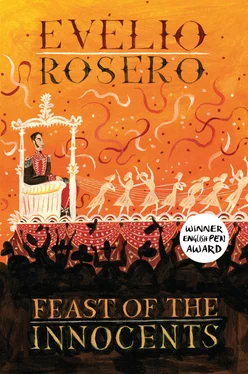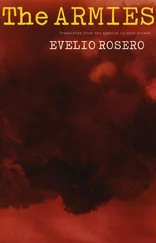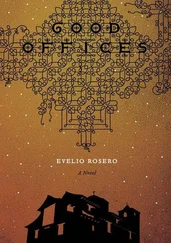“Doctor?”
He opened the door like it was his salvation.
“It’s a miracle,” Sinfín said, “that at this hour of the morning the poor of Pasto are sleeping, like you. They must have drunk from that river that turned into aguardiente , like you did. Here are your shoes and trousers, which I found in the street, Doctor; I was going out to buy salt for the corn parcels and what do I see, what can I be seeing? The doctor’s shoes and trousers lying around, are those really the doctor’s shoes and trousers? Yes they are, I’ve washed those trousers myself a thousand and one times, I know them like the back of my hand, there they were, Doctor, looking like a sleeping drunk, but they were your shoes and your trousers with the pockets well-filled, thank God I saw them first, no poor beggar came along, everyone already knows the rich have better luck than the poor, is that fair, Don Justo Pastor? Don’t you think the time is coming to stop drinking? A nice shower would do you good, a vegetable broth, or do you fancy a roast guinea pig?”
She handed him the shoes and his trousers, the pockets bulging with banknotes.
“You don’t just throw this stuff out the window, just like that,” she went on, bitterly, and she left, before the doctor could reply.
The doctor put the money away again, into the trousers he had just put on. He pulled on his shoes, thinking that, far from calling a halt, he would have to drink more aguardiente if he wanted to get his head straight, to wake up, as he was not managing to emerge from his dream: he knew he was awake, but he was still suffering the same loneliness — he just could not get out of his dream.
Genoveva Sinfín had not closed the consulting room door, which gave onto the living room. In the furthest corner, bathed in sunshine, little girls and bigger ones were painting their faces black. Standing around, dressed up as flowers, they were contemplating themselves in round hand mirrors, examining themselves with extraordinary attention, what were they looking at? He recognized his daughters, both rapt, in the midst of cousins and friends, the outlandish paper petals, the long quivering stamens did not hide them. What flowers were they disguised as? Now they all had black faces. Some of them had smeared their necks too, shoulders bare. The doctor was grateful for the crystal-clear voices, the garden of bright eyes, and the crowd of human flowers who freed him from the dream. Floridita was identifiable by her laugh, the tinkling but extravagant laughter that reminded him of Primavera: of Primavera herself there was not a whisper. What if I find her dressed as a flower? — he wondered.
Sinfín reappeared. She brought a tray of two steaming roast guinea pigs, which the doctor ate with his fingers, the way they should be eaten, and he polished off the whole lot, heads and all, but he ate standing up, entertained by the group of girls painting themselves; he did not want to sit at the table; he got Sinfín to pour him a glass of aguardiente and drank it—“to your health, Señora Genoveva Without Sin.” She shook her head, disapprovingly. Sinfín always appeared where she had to, she saw and knew everything, she was an oracle, he thought. He asked her where he would find Primavera:
“She’s having a shower now, Doctor. She had a cruel morning.”
And then:
“That must be the reason she’s going out, alone. She’ll leave the house to celebrate Black Day, all on her own. The girls are staying here: it’s their big flower party.”
He headed for the stairs, followed by Sinfín at all times. He skirted the edge of the garden: not one of the flowers noticed him; Luz de Luna did not even glance at him out of the corner of her eye; she looked more beautiful black, he thought, her eyes were luminous. But didn’t that flower appear to be sprouting a monster? Fur, tongue and fangs? Who thought up a carnivorous rose as a costume? Floridita, he discovered.
He got to their bedroom on the second floor, where water from the shower was hammering down in the en-suite bathroom. Hearing the water fall, he imagined Primavera’s nakedness, vividly, as if she were before him. He trembled in spite of himself. Then he took the wads of notes from his pockets and scattered them over the bed. But he thought better of it and took one of the bundles back; he picked up another and gave it to Sinfín, who received it as though she had never been given it: she hid it in her bra and crossed herself.
They went down the stairs without hurrying, but it seemed like they were both running away. Only Sinfín’s voice could be heard, sounding sympathetic, perhaps to occupy the doctor’s mind with less solemn matters than Primavera:
“How lovely that carnival float you had made is, Doctor, but how sad too, eh? I saw it last night, they invited me over to see it, because I’m part of this household, your household. I know where they’re hiding it, if you want to go by and correct any mistakes before the parade, they told me to tell you that your friends want you there, why don’t you go along? You’ve got them all on tenterhooks waiting for you, go on, Doctor, go and have a look: a single one of Bolívar’s hands is as big as the cathedral door; imagine the eyes like two wheels, they look up and down and shoot side to side, not just as if they’re alive but crazy too, and they look at you like he’s going to eat you up; what a tree stump of a nose, giant boots, giant spurs, the sword of a Goliath; they told me they had to take the whole head out through the roof, they had such trouble fixing it to the body, they say it weighs two tons altogether, there are loads of people working now to attach the carriage to the lorry, all will be well providing the engine works and Don Martín doesn’t get drunk on us and instead of taking a turn around Pasto head off up the volcano and hurtle down inside with his Bolívar on his back. It’s an absolutely immense Bolívar: his nose looks as though everything smells bad to him, lips as though he’s about to curse, and how lovely and lively those girls are who pull him along, they look about to burst into song, that’s how real they made them, Doctor, the smiles on their little mouths are very pretty, as gentle as kittens stretched out in the sun, but all those dead bodies around the edge, those unscreamed screams, that shower of blood, those hands tied up and so much pain, it scares you just to look at it. Was it true? Or did it only happen in a bad dream?”
“It happened in Pasto,” the doctor said.
“Don’t you want coffee? What do you want to do?”
“I’m going out.”
“So it’s true; don’t you want to go see the carriage?”
“I’ll go tomorrow.”
And the doctor ventured out into Black Day.
He went along thinking about Black Day like the historian he was not: the celebration had been born out of jubilant amazement in 1607, when the slaves threw themselves into enjoying a “day off,” the freedom of one day in the whole year granted by the Spanish king. In Pasto, this free day only got going in 1854: blacks went out to dance in the streets and their masters allowed them to come up and daub their white faces with charcoal, and the slaves must have done it with affectionate terror, or justifiably murderous intentions; but either way, certain that underneath it all they were still touching skin that was skin, with blood inside it just the same, the same shit from a different bum, he thought. The carnival began in 1926, always under that premise: one day’s freedom, its celebration; painting faces — hiding your face? — hiding and becoming like everyone else; the silent one shouted, the one who did not dance danced and the one who went without love loved — exactly like me, he thought, in the thick of the crowd on a carnival corner; he did not need to paint his face: in less than a minute the first revellers of the day painted him down to the neck, delighted to take an unsuspecting fool with no paint on his cheeks by surprise, but all the fool wanted was to be painted as soon as possible — Mandarina’s big yellow house was waiting for him ten steps away, open.
Читать дальше












